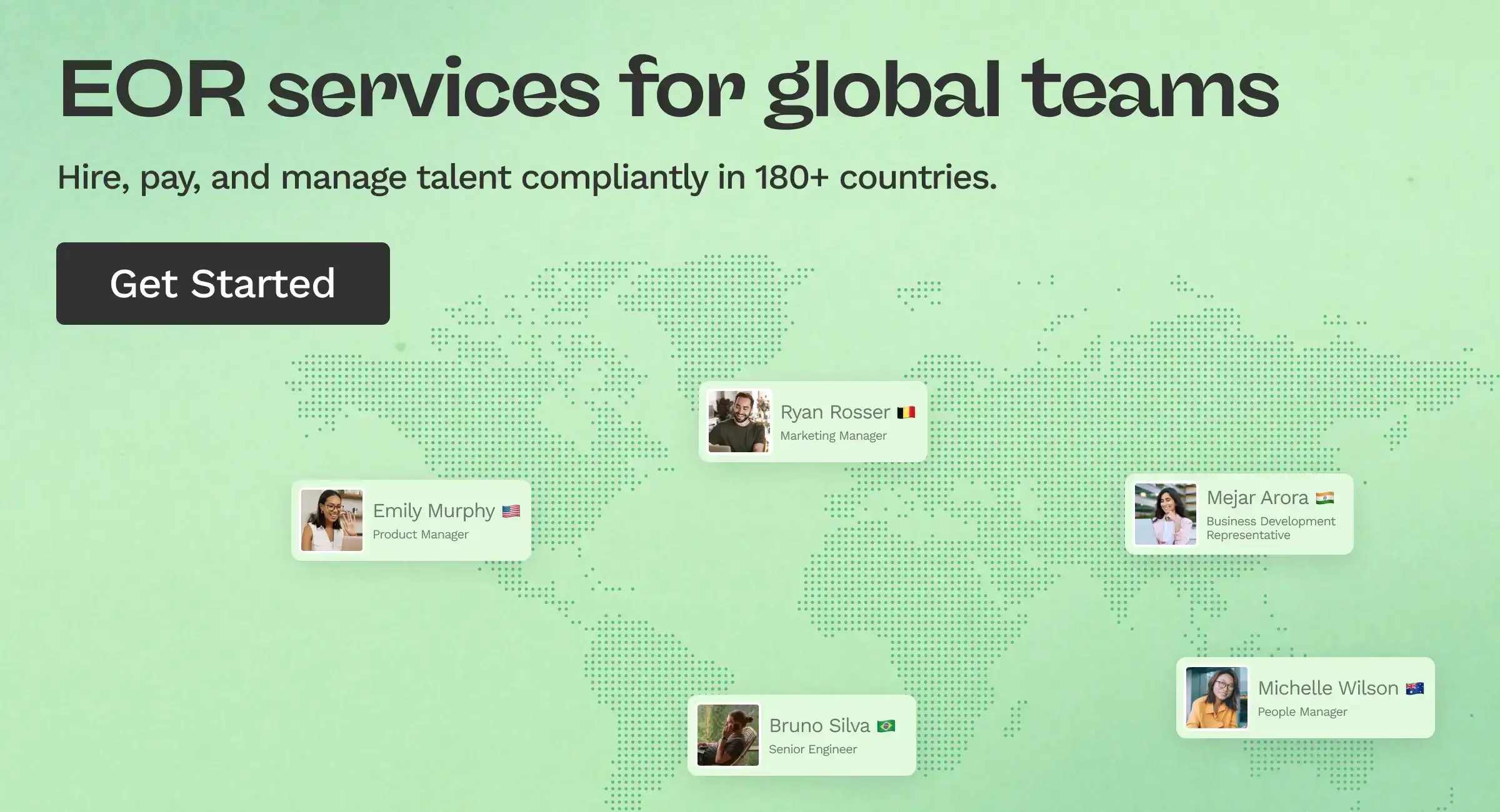Thinking about moving to Mexico? You’re not alone. International workers from around the world continue to choose Mexico for its warm climate, vibrant culture, and comparatively affordable lifestyle. With bustling hubs like Guadalajara and coastal retreats like Puerto Vallarta supporting Mexico’s growing economy, the country offers something for everyone.
Before you pack your bags, it's important to understand the legal steps you’ll need to take to be compliant with local and international laws. This Mexico relocation guide covers the practical side of relocating: visa options, cost of living, and the best places for international workers to settle. Read on for more information about moving to Mexico from abroad.
What to know about moving to Mexico
Mexico attracts one of the largest immigrant communities in the world, with the Mexican government welcoming foreigners who contribute to the local economy and culture. The U.S. State Department estimates that around 1.6 million U.S. citizens live in Mexico, making them the largest group of international residents in the country.
But U.S. citizens aren’t alone—there are also many expats in Mexico from other Spanish-speaking countries, along with communities from Canada, Europe (especially Germany), and Asia. The large population of international workers and immigrants can give new arrivals a strong support network and a sense of belonging within Mexico’s already vibrant culture.
You’ll hear plenty of English in the tourist zones and certain neighborhoods with large immigrant communities, but day-to-day life runs on Spanish, so learn at least the basics before you arrive. Locals tend to be patient with new language-learners, which can make an unfamiliar setting feel less intimidating.
Mexico also scores high with international residents for lifestyle and community. Survey data consistently ranks the country near the top for ease of settling in, social life, and personal finances, which lines up with what many newcomers experience on the ground.
An easy time getting comfortable isn’t the only thing to consider before you move. Healthcare, personal safety, and economic potential are also major factors.
Healthcare
If you work in Mexico, you and your employer contribute money every month to the public healthcare system. Anyone, regardless of working status, can use the public healthcare system in Mexico. However, many international workers still choose private coverage or pay out of pocket for faster access, more choices, and English-speaking staff. Big city hospitals offer excellent care, and routine visits can cost far less than in the U.S. Note that Medicare coverage outside of the U.S. is available in some countries, but not Mexico.
Safety
Safety varies by city and by neighborhood. Newcomers often choose places with steady reputations, such as Mérida, Cancún, Tulum, Guadalajara, and Querétaro, and then keep an eye on local updates because conditions can change.
Getting around between cities is straightforward with tolled highways, frequent flights from 80 recognized airports, and comfortable long-distance buses. For those living near the U.S. border, crossing for shopping or visiting family is also commonplace, but be aware of changing rules about who can cross the U.S.-Mexico border and when.
Economics
Lower taxes in Mexico can mean more take-home pay and purchasing power, but they also translate into leaner public services. International workers often budget for private options like schooling and healthcare. Mexico’s economy is heavily reliant on the manufacturing industry, and major cities like Mexico City anchor a growing professional scene that draws younger workers and families.
Cost of living in Mexico
The cost of living in Mexico comes in well below U.S. averages, which is one of the biggest draws for international workers coming from the U.S. Numbeo estimates that, as of 2025, a family of four spends about $2,500/month (approximately 42,500 pesos), excluding rent, while a single person averages around $690 (roughly 13,000 pesos).
Overall, prices in Mexico are roughly 40% lower than in the U.S., and rent averages nearly 60% lower. If you’re moving to Mexico from the U.S., you’ll notice how much further your money stretches, from groceries and dining out to utilities and transportation.
Applying for a visa and working in Mexico
For many international workers, a country’s job market is a deciding factor in where to build the next chapter of life. Mexico’s job market is expanding, and many opportunities exist for English-speaking professionals.
To work legally in Mexico, you’ll need the right visa. The process often starts with your employer, who must provide a letter confirming your job offer and salary. You’ll send that information, as well as a visa application and other required documents, to your nearest Mexican consulate, then take part in an interview to apply for a work visa. Within 30 days of your arrival in Mexico, visit the local Mexican immigration office to upgrade it to a Temporary or Permanent Work Visa.
Types of visas in Mexico
When you plan your stay, you’ll need to determine the right visa for your goals. Mexico offers several pathways, depending on how long you’ll be there and what you plan to do. These include:
- Visitors without Lucrative Activities: This visa is most applicable for people who own property in Mexico or are staying for a short period of time to help humanitarian causes or scientific studies. It lets non-residents make money in the country for less than 180 days, but you’ll need to make at least $1,400 per month or have $4,200 in your savings account to qualify.
- Temporary Resident Visa (Visa de Residente Temporal): The Temporary Resident Visa is often the path people explore when learning about working remotely in Mexico. Many retirees and remote workers use this visa, since it allows you to open a bank account, register a car, and have formal employment, but your pay needs to come from countries outside Mexico. It’s best for longer stays, between six months and four years, and you’ll need to show proof of income or hefty savings (at least $70,000) to qualify. Mexico has no separate visa category for digital nomads, so people take the Temporary Resident Visa pathway.
- Permanent Resident Visa (Visa de Residente Permamente): This visa is designed for those who plan to settle long-term. It’s often granted to retirees with higher incomes, people with family ties to Mexico, or those who’ve already lived there under temporary status. Unlike temporary options, this visa doesn’t require renewal and provides full residency rights.
Most visas take between one and 10 business days to process, but can take as long as four weeks. All visas, regardless of type, cost $54 to process. The Mexican government recommends giving yourself two months to complete the visa application process, and contacting your local consulate for an appointment three months in advance of your moving date.
How to move to Mexico: 6 steps
You’ll need to start thinking about your move to Mexico long before you pack up your life. Here are six steps to get you started:
- Secure a job offer: If you’re moving for work, ask your employer for a job offer letter that confirms your role and salary. This will support your visa application and give you a clearer path to residency.
- Sort out your visa: Decide on which visa type fits your situation—Visitor without Lucrative Activities, Temporary Resident, or Permanent Resident—and gather the documents you’ll need to submit. You can lean on visa support services or employer guidance to make sure nothing gets missed.
- Submit your application: Submit your visa application, required documents, and $54 processing fee at least two months before you plan to move. You’ll need to make an appointment with your local consulate. Your visa application won’t be processed without this interview, which verifies your identity and confirms why you’re hoping to relocate to Mexico. Note that if you’re moving with family, each individual will need their own appointment.
- Set up your finances: Once you arrive, open a local bank account. It will make receiving your salary, paying rent and utilities, and other parts of your day-to-day life easier.
- Find housing: Explore neighborhoods that match your lifestyle and budget. Prefer cool evenings at high altitude? Head for places like Oaxaca, Guadalajara, Mexico City, or the colonial town of San Miguel de Allende, known for its thriving immigrant community. Crave heat and surf? Coastal towns, from Mazatlan to Tulum, run warm and tropical most of the year. International residents often cluster in cities like Mexico City and Guadalajara, and coastal areas like Playa del Carmen.
- Plan everyday logistics: Consider your regular transportation methods, schooling if you have children, and learning Spanish if you don’t already speak it. If you’re interested in private healthcare, look into different plans to see what will fit your needs. Some employers offer private healthcare to employees, as well as a grocery coupon card (called vales de despensa), so if you’re working for a Mexico-based company, see if they offer those benefits. Having these details determined in advance goes a long way toward a smoother move.
Manage global relocation with Oyster
Mexico’s growing economy is attractive to many working professionals around the world, so companies need to be ready to support employees who want to relocate. Oyster can smooth the process of visa sponsorship in Mexico—and more than 60 other countries—for your organization.
In addition to supporting employee relocation, Oyster can also help you expand your team in Mexico. If you want to onboard Mexican talent, Oyster can help you do so in full compliance with Mexican labor laws.
Support your team members in Mexico, whether you’re hiring globally or helping them move, with Oyster’s global compliance and talent mobility solutions.

About Oyster
Oyster is a global employment platform designed to enable visionary HR leaders to find, engage, pay, manage, develop, and take care of a thriving distributed workforce. Oyster lets growing companies give valued international team members the experience they deserve, without the usual headaches and expense.
Oyster enables hiring anywhere in the world—with reliable, compliant payroll, and great local benefits and perks.
.webp)




.webp)
.webp)







_Leader_Leader%201%20(2)%20(3).svg)
_Leader_UnitedKingdom_Leader%201%20(1).svg)
_Leader_Europe_Leader%201%20(1).svg)
_Leader_Mid-Market_Leader%201%20(1).svg)
_Leader_Small-Business_Europe_Leader%202%20(2).svg)
_Leader_Small-Business_Leader%201%20(1).svg)
_FastestImplementation_Small-Business_GoLiveTime%201%20(1)%20(1).svg)